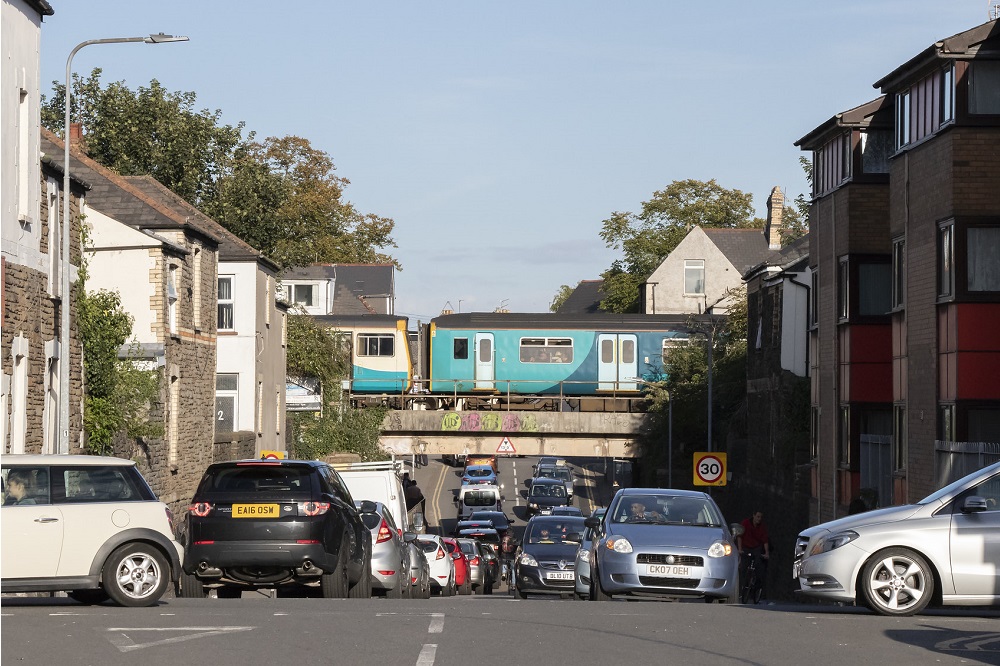A Clean Air Zone could be the fastest way to reduce traffic pollution in Cardiff

Huw Cook, British Lung Foundation
From our first breath to our last, the air we breathe is constantly changing. We see stories of shifting landscapes, plastic oceans and endangered species but continue to underestimate the lasting damage we to do to ourselves as a result of air pollution.
When we make endless car journeys, smoke cigarettes or use wood burners, these are just some of the ways in which we release harmful chemicals into the air around us. And when we can’t see the dirt in our air, it’s difficult to understand just how much damage it’s doing to our health. After all, if the air we breathe isn’t clean, neither are our lungs.
While more people are beginning to understand air pollution threatens the well-being of future generations, we often forget the threat it poses now, particularly to the most vulnerable members of society.
Children’s lungs rely on clean air for healthy growth and development. Breathing in polluted air can stunt the growth of children’s lungs and potentially create long-term damage that’ll follow them for the rest of their lives.
A recent global Lancet study revealed 13% of new childhood asthma cases in the UK were a result of poor air quality. Given the amount of time children spend at and travelling too school, we need much more robust action to reduce emissions near schools. This means encouraging active travel to and from school, banning idling outside of the school gate or making our school streets completely car-free.
With these robust measures we could help eliminate a huge risk to our children’s health and create a safe, clean space in which they can learn.
Similarly, older people and people living with existing lung conditions, are more prone to respiratory infections and ill health as a result of breathing in air pollution.
Our latest British Lung Foundation report revealed that 26 GP practices across Cardiff are located in areas with unsafe levels of particulate pollution, meaning many of our most vulnerable citizens, seeking medical assistance, could be exposed to toxic air that could aggravate pre-existing medical conditions such as asthma and chronic obstructive pulmonary disease (COPD).
It’s important to understand that no amount of air pollution is good for our health. Breathing in traffic pollution can shorten our life expectancy and increase hospital admissions, a high price to pay for the convenience of driving from A to B.
Future
Plans from Cardiff Council hope to change this. By improving active travel provisions, upgrading local bus services and refining traffic flow in the city centre, they hope people will be inspired to leave their cars at home and choose a more environmentally friendly way to travel.
Over two years the £32 million proposed plan aims to achieve air pollution levels that comply with EU regulation by 2021.
But with all levels of air pollution posing some risk to public health, can we afford to set our goal at compliance rather than trying to achieve the cleanest air possible? If we were to look at bolder alternatives, achieving the cleanest air possible could be well within our reach.
Mounting evidence suggests a charging Clean Air Zone (CAZ) is the most effective means of reducing traffic emissions in the fastest time possible. This would see heavily polluting vehicles that do not meet emissions standards pay a fixed fee for entering the zone or alternatively see them charged a fixed penalty for failure to comply with standards.
This could see a major shift in people’s attitudes to driving as a result of bold policy action, the likes of which we haven’t seen since the indoor smoking ban of 2007. Like the smoking ban, if this was introduced as a public health intervention, this localised change could see a ripple effect encouraging drivers to question their use of heavily polluting vehicles beyond the limits of the zone.
Information from Cardiff Council suggests a charging CAZ isn’t completely off the table, but a delay in its implementation could prolong our clean air journey, making the road to healthy air even longer.
With the likes of David Attenborough and Greta Thunberg standing up for our oceans and climate, can we become the role models who stand up against air pollution, leaving a clean air legacy and a new hope for future generations in Wales?
Cardiff Council are running the Clean Air Cardiff consultation, a chance for you to have your say on the air we breathe and determine the actions we take to improve our air quality.
By responding, you could ensure what we do now will have a major benefit for future generations and achieve the cleanest air possible in the shortest time.
We can’t run Nation.Cymru without your help! If you support the development of an independent Welsh media for the people of Wales, please donate now!
Support our Nation today
For the price of a cup of coffee a month you can help us create an independent, not-for-profit, national news service for the people of Wales, by the people of Wales.





